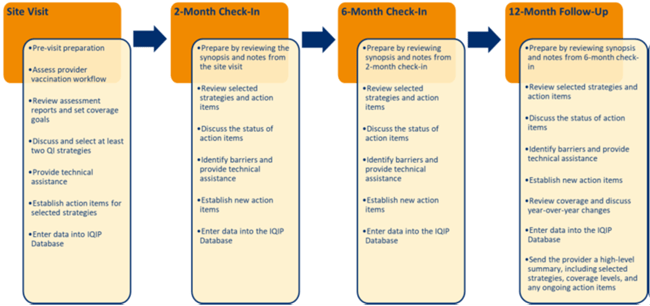The web Browser you are currently using is unsupported, and some features of this site may not work as intended. Please update to a modern browser such as Chrome, Firefox or Edge to experience all features Michigan.gov has to offer.
IQIP
Immunization Quality Improvement for Providers (IQIP)
Immunization Quality Improvement for Providers (IQIP) is CDC’s national, Vaccines for Children (VFC) provider-level immunization quality improvement (QI) program. The purpose of IQIP is to promote and support the implementation of provider-level strategies designed to help increase vaccination of children and adolescents.
IQIP is a 12-month process during which public health representatives and VFC providers collaborate to implement provider-level QI strategies to increase vaccine uptake by improving and enhancing vaccination workflow.

Resources to Support Site Visits
The documents below are for Local Health Department (LHD) and Michigan Department of Health & Human Services (MDHHS) consultants only. Please utilize these to support implementation of IQIP site visits.
IQIP Basics
- MI IQIP At-A-Glance for Consultants
- CDC IQIP Operations Guide - Updated 9/2025
- MI IQIP Database User Guide
- MI Summary of IQIP Requirements
- MI IQIP Cycle Process
Site Visit Resources
- Michigan IQIP Preparation Checklist
- MI IQIP Visit Confirmation Letter (Word Document download)
- Safety Guidance for VFC & QI Site Visits
- MI Effective Communication for IQIP Consultants
- MI IQIP The Role of the Immunization Champion
- MI IQIP Technical Assistance For Consultants
- MI QI Site Visit Form + IQIP Coverage Goals Form (Word Document download)
- MI Tips for Conducting TeleIQIP Site Visits
- Immunization Fixed Fees Quarterly Summary Worksheet for 2024-2025 (Excel Sheet download)
IQIP Core Strategies
The IQIP strategies call for quality improvement activities that focus on improvements to the vaccination workflow to increase vaccination rates of children and adolescents.
The Four IQIP Core Strategies:
-
Facilitate Return for Vaccination
Facilitating patient return for vaccination focuses on implementing clinical and clerical processes that support keeping follow-up appointments and addresses barriers to patients returning for vaccination.
Facilitating the patient’s return for vaccination promotes adherence to the schedule by:
- Explicitly specifying when future doses are due and why.
- Establishing continuity of care by supporting the patient's return to the office.
- Creating a commitment to return and reducing barriers to act on favorable intentions to vaccinate.
Resources for Facilitating Return for Vaccination:
-
Leverage Immunization Information System (IIS) Functionality
On-time vaccination depends on knowing what vaccines a patient is due for and when. High-quality data in the IIS can support providers to improve immunization practice by:
- Providing consolidated vaccination records for each patient
- Generating lists of patients due for vaccines
- Forecasting future dose due dates to assist with scheduling
- Delivering reminders for upcoming appointments
- Providing practice-based coverage assessments
Resources for Leveraging IIS Functionality to Improve Immunization Practice
-
Give a Strong Vaccine Recommendation
On-time vaccination is dependent upon parents choosing to vaccinate their children and adolescents. As parents’ most trusted source of vaccine information, health care professionals are well positioned to increase vaccine acceptance.
Resources for Giving a Strong Vaccine Recommendation
-
Strengthen Vaccination Communications
Myths and misinformation about vaccines put on-time vaccination at risk. Trust in vaccines is not built through a top-down approach, but through conversations between parents, doctors, nurses, pharmacists, and community members. Patients and parents can feel more confident about vaccinating when everyone in the practice shares the same message.